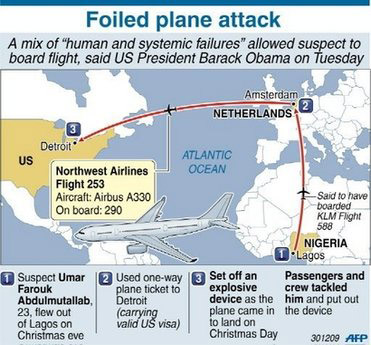
|  |  |  Americas & Beyond | December 2009 Americas & Beyond | December 2009  
Obama Finally Admits Intelligence Failures
 Capitol Hill Blue & Associated Press Capitol Hill Blue & Associated Press
go to original
December 30, 2009


| | Graphic explaining the foiled jet attack. Barack Obama has lashed out at systemic intelligence failures over an attempted attack on a US jet amid reports that Washington was planning reprisal strikes against targets in Yemen. (AFP/) |  |
Suddenly, four days after an aborted terror attack aboard an American airliner, President Barack Obama wants answers on why information wasn't put together by the U.S. intelligence community to prevent the terrorist from even getting on the plane.

After first claiming the system "had worked," Obama appears to finally have realized that the system failed and action must be taken correct the problems that - once again - allowed a bomber to put Americans in danger.

The father of Umar Farouk Adbulmatallab did everything short of delivering his son in shackles to the American Embassy but U.S. agencies did not share information with each other or connect the dots on a real threat.

Eight years after the 9/11 terror attacks on the World Trade Center and Pentagon, the failure shows the country has not learned from past mistakes.

Administration officials are poring over reams of data, looking for failings that allowed Abdulmutallab, a 23-year-old Nigerian with suspected ties to al-Qaida, to board the Northwest Airlines flight from Nigeria by way of Amsterdam.

Obama's criticism came as senior U.S. officials told The Associated Press that intelligence authorities now are looking at conversations between the suspect in the failed attack and at least one al-Qaida member. The officials, who spoke on condition of anonymity to discuss intelligence matters, said the conversations were vague or coded, but the intelligence community believes that, in hindsight, the communications may have been referring to the Detroit attack. One official said a link between the suspect's planning and al-Qaida's goals was becoming clearer.

The New York Times reported in Wednesday's editions that the government had intelligence from Yemen before Christmas that leaders of a branch of al-Qaida there were talking about "a Nigerian" being prepared for a terrorist attack. The newspaper said the information did not include the name of the Nigerian.

Obama's homeland security and counterterrorism adviser, John Brennan, is due to present the president with an early report by Thursday, based on recommendations and summaries from across the government.

"There were bits of information available within the intelligence community that could have — and should have — been pieced together," Obama said in a brief statement to reporters Tuesday.

"Had this critical information been shared, it could have been compiled with other intelligence, and a fuller, clearer picture of the suspect would have emerged," Obama said. "The warning signs would have triggered red flags, and the suspect would have never been allowed to board that plane for America."

Senior administration officials said the system to protect the nation's skies was deeply flawed and, even then, the government failed to follow its own directives. They described a breakdown that would have been much worse had Abdulmutallab been successful; an angry Obama called the situation "totally unacceptable."

"It now appears that weeks ago this information was passed to a component of our intelligence community but was not effectively distributed so as to get the suspect, Umar Farouk Abdulmutallab, on a no-fly list," Obama said.

Obama first spoke to reporters Monday after three days of silence. On Tuesday, he chided officials for what he called a "potential catastrophic breach of security." Critics have questioned why Obama didn't talk sooner about the issue publicly.

Officials said Obama chose to make his second statement in as many days after a morning briefing offered him new information about the suspect's activities and thinking, along with al-Qaida's plans.

It will take weeks for a more comprehensive investigation into what allowed Abdulmutallab to board the airliner he is accused of trying to blow up with more than 300 people aboard. Law enforcement officials believe the suspect tried to ignite a two-part concoction of the high explosive PETN and possibly a glycol-based liquid explosive, setting off popping, smoke and some fire but no deadly detonation. Abdulmutallab, charged with trying to destroy an aircraft, is being held at the federal prison in Milan, Mich.

Abdulmutallab had been placed in one expansive database, but he never made it onto more restrictive lists that would have caught the attention of U.S. counterterrorist screeners, despite his father's warnings to U.S. Embassy officials in Nigeria last month. Those warnings also did not result in Abdulmutallab's U.S. visa being revoked.

Intelligence officials began laying blame on other agencies.

The CIA said it worked with embassy officials to make sure that Abdulmutallab's name made it into the government's database of suspected terrorists and noted his potential extremist connections in Yemen. The CIA said it forwarded that information to the National Counterterrorism Center.

Intelligence officials say they learned the suspect's name in November, when his father came to the U.S. Embassy in Nigeria and sought help in finding him.

One U.S. intelligence official said Abdulmutallab's father didn't provide sufficient information to earn him a spot on the no-fly list.

"Abdulmutallab's father didn't say his son was a terrorist, let alone planning an attack. Not at all," the official said on condition of anonymity in order to discuss sensitive intelligence matters. "I'm not aware of some magic piece of intelligence that suddenly would have flagged this guy — whose name nobody even had until November — as a killer en route to America, let alone something that anybody withheld."

Officials in Yemen were investigating whether Abdulmutallab spent time with al-Qaida militants there during the months leading up to Friday's attack.
|

 |
|  |



